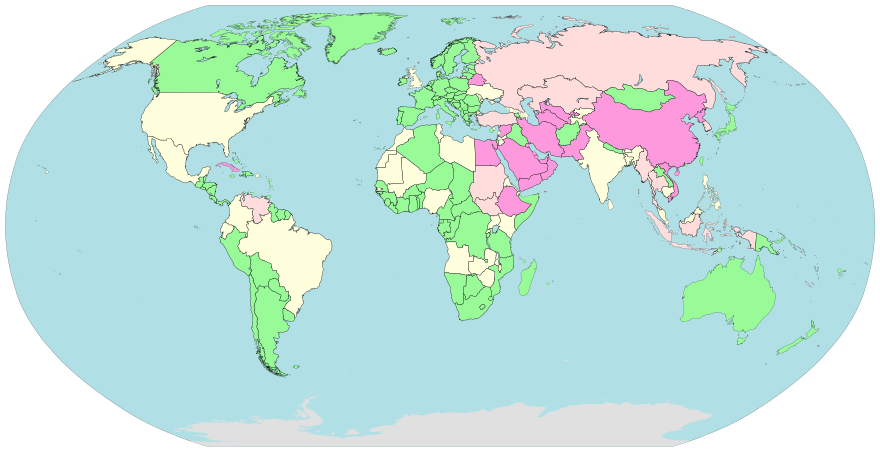
Chris Powell: Fight bulimia with censorship?
Internet censorship by country: Dark pink has pervasive censorship; light pink substantial; yellow selective, and green little or none.
The plaster cast of Michelangelo’s ‘‘David ‘‘ at the Victoria and Albert Museum, in London, has a detachable plaster fig leaf displayed nearby. Legend claims that the fig leaf was created in response to Queen Victoria's shock upon first viewing the statue's nudity, and was hung on the figure before royal visits, using two strategically placed hooks.
MANCHESTER, Conn.
Nearly everyone on Planet Earth with Internet access seems to use the social-media platform Facebook and its subsidiary Instagram even as last week's U.S. Senate subcommittee hearing over which Connecticut's Richard Blumenthal presided suggested that Facebook is an evil scheme to push young teenage girls into bulimia and other psychological disorders.
Facebook and Instagram certainly have brought out the latent narcissism of hundreds of millions of people, allowing them to spend half their day inflicting on others every trivial detail of their lives. But of course no one is compelled to participate in social media, and young teenage girls can participate only if their parents provide them with cell phones, computers and Internet access and pay little attention to what the kids do with those things.
This seemed lost on last week's hearing, as Senator Blumenthal read aloud a text message he said he had received from an unidentified father:
“My 15-year-old daughter loved her body at 14, was on Instagram constantly and maybe posting too much. Suddenly she started hating her body -- her body dysmorphia, now anorexia -- and was in deep, deep trouble before we found treatment. I fear she will never be the same.”
So who is responsible? The hearing accused Facebook co-founder and CEO Mark Zuckerberg.
And what is the remedy? The hearing seemed to be demanding censorship by the government.
"Facebook and Big Tech are facing a ‘Big Tobacco' moment," Blumenthal said, referring to the tobacco industry's long struggle against regulation of its product and its concealment of research showing that -- as everyone with half a brain had known for hundreds of years -- using tobacco is unhealthy.
Former Facebook employee Frances Haugen testified that the company knows that teenage girls are especially vulnerable to what may be said about them on social media -- as if anyone needed confidential company documents to confirm the neurotic tendencies of teenage girls.
But Facebook's product and the major product of technology companies is not tobacco. It is speech and self-expression, freedom of which is constitutionally guaranteed even when it is narcissistic, stupid, mistaken and capable of being construed destructively. All other vehicles for conveying expression and information are just as capable of facilitating the harm being attributed to Facebook and Instagram.
Haugen suggested that Congress repeal the law exempting Internet companies from being sued for content posted by their users. That well might be the end of social media, since there is no way to police large volumes of social-media postings except by using computer programs to target keywords, a mechanism that censors the innocent and the guilty alike.
And what about the individual privacy of communicating by Internet? Should the government be empowered to compel Facebook and other social-media companies to become general censors? If government can do that to social-media companies, it can do that to newspapers, magazines, broadcasters, e-mail service providers and even telephone companies.
While the teen years always will be full of psychological stress, most young people in the land of the free have recovered more or less and grown up to be glad of their freedom.
Yet last month the FBI reported a 30 percent annual increase in murders in this country, from which no one will be recovering. The country is coming apart, and it's not because of Facebook and bulimia.
xxx
Farmington's police union president, Sgt. Steve Egan, blames Connecticut's new police accountability law for the severe injury inflicted on Officer James O'Donnell last month when a man driving a stolen car sped off, crushing the officer against his cruiser.
No evidence has been provided for the union president's claim. But a failure of law can be seen here. For the man charged in the incident is reported to have a long criminal record. That is, a state with an incorrigibility law already might have put him away for life, or at least for enough years to eliminate his capacity for crime.
Connecticut is not such a state. Instead of enacting an incorrigibility law the state keeps closing prisons and letting incorrigibles hurt people.
Chris Powell is a columnist for the Journal Inquirer, in Manchester.


